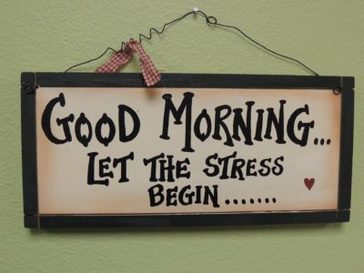
I'm not quite sure at what point stress enters into our life: is it the dramatic entry into the world, the trauma of high school or the first big career advancement opportunity? It can happen at any time, and as soon as we put a label on our state of being as one of "stressed", everything changes.
It seems that even the innocence of youth has been lost to this badge of "I'm so stressed I can't even". Oh, the simpler days of meeting up with friends "out back", and running around all day, stopping only to whip home for a quick bite to eat, then getting out there again until the streetlights came on, which was your cue to get inside before the folks had to come looking for you. This has been replaced with endless hours glued to technology devices, the push to over-achieve in every single subject in school (ok, that's not new), participating - and competing - in endless after-school activities to keep your brain and body strong. We are popping out more anxious kids than ever.
In an older (2007) study published by Stats Canada on teenagers and workload summarized that, "16% considered themselves workaholics, 39% felt under constant pressure to accomplish more than they could handle, and most (64%) cut back on sleep to get things done." Newer statistics indicate that 20% of Canadians aged 15-24 have experienced a mental health episode. This number grows for the 25-44 age group. Another survey indicates that 27% of those in the workforce identify as being stressed. (To find out the breakdown of what the stressors are, click here.)
Stress is not new. Your parents felt stress, as did their parents and their parents. But its landscape has definitely changed. The experience of stress in prior generations tended towards hardships that were endured for survival as opposed to lifestyle, with a goal of getting past it. Today it's become an expectation that unless you're stressed and expressing it often, you're not trying hard enough. If you don't participate in stress generating activities that negatively impact your life, you're somehow "less than". People who actually maintain a healthy work-life balance are selfish, and/or aren't deserving of career advancement. We've come to embrace our level of stress as a symbol of status among our friends and colleagues. We've let ourselves believe that stress-filled days and nights is the only acceptable and deserving state of being. Not only is that not true, stress can severely compromise not only your ability to achieve the goals that you desire, but also your overall health.
Our body is built to effectively manage stress, but in short doses. The stresses of today's society are less about the physical response to staying alive and more about the emotional and mental response to being/getting/having more. (Stay tuned for the upcoming post on what stress does to your body.)
For today, I encourage you to re-evaluate your relationship with stress. Sit with it, talk to it, find out what's serving you and what's not. Instead of personifying stress - using it to define you, e.g. "my stress", "I am stressed" - start to separate your identity from it, e.g. "when this happens, stress comes into play". Write out the thoughts, activities and behaviours which can trigger a stress response - positive or negative - and ask yourself what you can think or do differently to get the same - or better - result without letting stress be the primary fuel.
How can I help? Acupuncture is like therapy for the nervous system. With a full course of treatment followed by ongoing preventive maintenance, acupuncture helps the nervous system adapt and re-educate itself to operate in a more optimal way. Together we can identify your stressors and triggers, re-balance your body, find ways to reduce the events that cause stress, and employ effective stress management techniques.
Achieving your goals and a lifestyle you desire will likely involve a certain amount of stress. Not letting it get out of hand is key to your ability to stay healthy along the way, so that you can maintain your goals once you get there. And you do deserve that, we all do.
~ Cary Rendek
It seems that even the innocence of youth has been lost to this badge of "I'm so stressed I can't even". Oh, the simpler days of meeting up with friends "out back", and running around all day, stopping only to whip home for a quick bite to eat, then getting out there again until the streetlights came on, which was your cue to get inside before the folks had to come looking for you. This has been replaced with endless hours glued to technology devices, the push to over-achieve in every single subject in school (ok, that's not new), participating - and competing - in endless after-school activities to keep your brain and body strong. We are popping out more anxious kids than ever.
In an older (2007) study published by Stats Canada on teenagers and workload summarized that, "16% considered themselves workaholics, 39% felt under constant pressure to accomplish more than they could handle, and most (64%) cut back on sleep to get things done." Newer statistics indicate that 20% of Canadians aged 15-24 have experienced a mental health episode. This number grows for the 25-44 age group. Another survey indicates that 27% of those in the workforce identify as being stressed. (To find out the breakdown of what the stressors are, click here.)
Stress is not new. Your parents felt stress, as did their parents and their parents. But its landscape has definitely changed. The experience of stress in prior generations tended towards hardships that were endured for survival as opposed to lifestyle, with a goal of getting past it. Today it's become an expectation that unless you're stressed and expressing it often, you're not trying hard enough. If you don't participate in stress generating activities that negatively impact your life, you're somehow "less than". People who actually maintain a healthy work-life balance are selfish, and/or aren't deserving of career advancement. We've come to embrace our level of stress as a symbol of status among our friends and colleagues. We've let ourselves believe that stress-filled days and nights is the only acceptable and deserving state of being. Not only is that not true, stress can severely compromise not only your ability to achieve the goals that you desire, but also your overall health.
Our body is built to effectively manage stress, but in short doses. The stresses of today's society are less about the physical response to staying alive and more about the emotional and mental response to being/getting/having more. (Stay tuned for the upcoming post on what stress does to your body.)
For today, I encourage you to re-evaluate your relationship with stress. Sit with it, talk to it, find out what's serving you and what's not. Instead of personifying stress - using it to define you, e.g. "my stress", "I am stressed" - start to separate your identity from it, e.g. "when this happens, stress comes into play". Write out the thoughts, activities and behaviours which can trigger a stress response - positive or negative - and ask yourself what you can think or do differently to get the same - or better - result without letting stress be the primary fuel.
How can I help? Acupuncture is like therapy for the nervous system. With a full course of treatment followed by ongoing preventive maintenance, acupuncture helps the nervous system adapt and re-educate itself to operate in a more optimal way. Together we can identify your stressors and triggers, re-balance your body, find ways to reduce the events that cause stress, and employ effective stress management techniques.
Achieving your goals and a lifestyle you desire will likely involve a certain amount of stress. Not letting it get out of hand is key to your ability to stay healthy along the way, so that you can maintain your goals once you get there. And you do deserve that, we all do.
~ Cary Rendek


 RSS Feed
RSS Feed
